Photographs: Paresh Gandhi
Rashid's first book on the Taliban shot to the top of The New York Times's bestsellers list after 9/11 and stayed there for weeks and was also translated to more than two dozen languages. He has just published another book Descent into Chaos: US Policy and the Failure of Nation Building in Pakistan, Afghanistan and Central Asia.
In an interview with rediff.com India Abroad's Aziz Haniffa, Rashid explains why India should cooperate with Pakistan to stabilise the situation in Afghanistan.
What's your take on the Obama administration's AfPak policy, particularly the regional approach, which includes India to help stabilise Afghanistan?
There are two aspects of the regional approach. One is to get all the six neighbours of Afghanistan around the table and get them to agree to stop destabilising Afghanistan, to stop interfering in Afghanistan and stop backing one or other proxy forces in Afghanistan.
 |
But in order to get these neighbours to agree to that, you also have to deal with the bilateral issues. Pakistan is not going to agree to that or to give up the Taliban option (as strategic depth against India in Afghanistan) -- unless you get Pakistan and India to sit down together and work out some kind of modus operandi so that Pakistan's army feels more secure and is able to deploy more troops on the Afghan border to keep the peace.
You need a series of bilateral dialogues to resolve these problems. You need America and Iran to talk to each other, you need Central Asia and Afghanistan, you need Pakistan and Central Asia. And, of course, vitally important, you need India and Pakistan to talk to each other. So, that's the idea of the recent strategy.
'India may face a border with the Taliban'
Image: Pakistan tanks patrol Buner district in the Swat valleyPhotographs: Reuters
But isn't this perceived threat from India -- as you have said on many occasions -- a state of denial by the Pakistan army?
Yes, but India should understand that it is also faced with this Taliban threat or this Talibanisation. If things go from bad to worse in Pakistan, India may face a border with the Taliban rather than with a functioning State. And, if you think infiltration into Kashmir is bad now, wait until you have to deal with the Taliban literally on the Indian border -- whether it's in the Northwest Frontier Province or Punjab. So, I hope that there will be increased Indian cooperation.
There seems to be this Pakistani paranoia about India's inclusion in this regional strategy by the Obama administration and a sense that the United States and India are ganging up against Pakistan -- a perceived conspiracy theory that you acknowledged, though you said you don't believe it. Islamabad went ballistic when Richard Holbrooke (special representative for Afghanistan and Pakistan), while he was in New Delhi, called India's engagement critical.
There is a lot of misunderstanding amongst the Pakistani authorities -- by the army, the civilian government -- as to what this regional approach entails. It doesn't mean involving India. What Holbrooke means is involving India as part of the solution and helping Pakistan ease tensions with India -- letting India and Pakistan cooperate on stabilising Afghanistan.
 |
It is not the American intention to somehow bring India into some kind of major role-playing in Kabul. So, I think elements of the Pakistan (establishment) have got it wrong. But I think, it's far more dangerous that the Indian commentators have very harshly criticised the article I wrote in Foreign Affairs in which I outlined this regional strategy back in November of last year.
And you've got former (Indian) foreign secretaries and people saying that this is a pro-Pakistan policy and all that, which is ridiculous. It is not (a pro-Pakistan policy) -- not at all. This is a policy that will ease tensions between India and Pakistan.
'Afghanistan is a major bone of contention'
Image: Hundreds of Jamaat-e-Islami activists demonstrate in Peshawar against US airstrikesPhotographs: Ali Imam/Reuters
How? Is cooperating on Afghanistan the way for India and Pakistan to resolve their differences?
Let's face it. One of the major bones of contention today is the Pakistani accusation that it makes against India's role in Kabul and India's defense of that and the defense of its role in Kabul.
India makes it very clear that its role in Afghanistan is only to help that country reconstruct and rehabilitate itself. The US has lauded this development role and looked to it as a template beyond the military strategy.
 |
But we need a dialogue between India and Pakistan on Afghanistan, and that should be done as quickly as possible. Even though we had bad relations, even though we are now not discussing Kashmir, even though there is difficulty because of the elections in India, there has got to be a dialogue -- and this should be held as soon as possible.
India and Pakistan should air their suspicions of each other on their involvement in Afghanistan. Let them be frank with each other and then let there be a process in which they can resolve these problems.
'The Taliban threat is reaching Karachi'
Image: Children, fleeing a military offensive in the Swat valley, chase after food donations at a UN campPhotographs: Ali Imam/Reuters
Is there a danger of Pakistan collapsing soon or imploding, as many analysts, intelligence, defense and administration officials in the US believe could happen in the next few months, if the Taliban is not stopped in its tracks?
I don't believe that Pakistan is about to implode, but certainly the government and the army have to show more leadership than what we've seen so far. And I think they are fully aware now that the threat is reaching Punjab, it is reaching Karachi, it is reaching parts well outside the NWFP. And, yes, the army's continuing awareness of the Indian threat has a lot to do with what it sees as the threat from India still.
But India has not been massing troops on its border with Pakistan.
 |
India has to understand that it is suffering enormously because of the Taliban and it should be more flexible. India has to help us get off the hook. We are on the hook of the Taliban right now, unfortunately, and India has to be a little more cooperative in getting us off this so that we can move (Pakistani troops off the Indian border to fight the Taliban).
'Iraq was an incredible distraction for Afghanistan and to Pakistan'
Image: US President Barack Obama with Afghanistan President Hamid Karzai and Pak President Asif Ali ZardariPhotographs: Kevin Lamarque/Reuters
You have slammed the Bush administration and lauded the Obama administration for its AfPak strategy, saying it should have been in place years ago.
There was this enormous failure by the Bush administration to take Afghanistan seriously when it should have, and particularly to help in nation-building in the wake of the 9/11 and after winning the war.
It failed to provide sufficient troops, aid, resources in order to get the Afghan economy working and to help in rebuilding the country's infrastructure and to get reconstruction going.
It could have helped in the building up of state organs like the army and the police. By the time it woke up to the dangers of the revival of Al Qaeda and the Taliban, more than three years had gone by and this window of opportunity to build a strong Afghanistan had been lost. As I said, it was no accident that as soon as the US got involved in Iraq, the Taliban started its insurgency.
 |
Iraq was such an incredible distraction for Afghanistan and to Pakistan. And it was this invasion that really fueled the whole new wave of anti-Americanism and also helped the revival of Al Qaeda and the resurgence of the Taliban. It was not just in Afghanistan and Pakistan, but Iraq was the spur for much of the radicalisation that has taken place by Muslims in Europe and elsewhere rather than any other event.
Of course, the other major mistake of the Bush administration was first of all to depend solely on the military in Pakistan and that too solely on one man -- (former Pakistani) president (Pervez) Musharraf -- to deliver. He did not go after the Taliban, but instead gave them sanctuary.
He only went after Al Qaeda and there was all this massive aid -- more than $11 billion over eight years -- from the US which went only to the military and did not reach the poor on the ground, which fueled even more anti-Americanism.
The other major mistake of the Bush administration was its failure to adopt any kind of a flexible regional strategy by bringing in the neighbouring countries of Afghanistan into some kind of a pact to support the US strategy and ultimately North Atlantic Treaty Orgainsation's effort to try and stabilise Afghanistan and stop the resurgence of the Taliban and the revival of Al Qaeda.
'There was in Afghanistan a very doable, winnable situation'
Image: Men build a shelter, for those displaced by the military offensive in Swat, at a UN campPhotographs: Ali Imam/Reuters
Can the comprehensive nature of the Obama strategy help in trying to stabilise Afghanistan and Pakistan?
Yes, because it's not just a military surge and not just to go after Al Qaeda as Bush did. This is a comprehensive plan and lots of the parts of this plan is what should have been put in place in Afghanistan immediately after 2001 and 2002 -- everything from reconstruction to getting the economy going.
 |
The biggest mistake was the neglect of the infrastructure and (not) helping to build the institutions of the army, the police and trying to revive the Afghan economy, which is there in this new plan. Just after 2001, there was in Afghanistan a very doable, winnable situation but the wrong policies and a complete lack of attention (spoiled that situation). And both in Afghanistan and Pakistan, they are very conscious of this lack of commitment.
'You can expect US casualties'
Image: US Marines during a patrol of the Golestan district in Farah provincePhotographs: Goran Tomasevic/Reuters
But surely there are major challenges to the AfPak strategy? If Pakistan unravels, it could knock the wind out of all these efforts.
There are definitely going to be major challenges in the next three to four months. The military surge of extra American troops are going to face a tough and very intense battle because the Taliban, Al Qaeda and all the extremist groups have been preparing to take on these Americans troops and are not going to retreat.
They are already dug in Helmut and Kandahar, which are the heartland of the Taliban and where they get the bulk of their support and recruits from.
 |
This is also the heartland of poppy cultivation from which the Taliban gets most of its funding from and it is also the key to the infiltration from Pakistan, from where most of the logistical supply comes from -- weapons to ammunition, in addition to fighters from areas such as Balochistan.
So, they will fight to the end in Helmut and Kandahar and you can expect US casualties and the Obama administration will have to bear that in addition to all of the criticism of the strategy already, although I don't agree with the pundits who say it will be Obama's Vietnam.
There is also the challenge of the Afghan election in August and it is vital that these elections are held and the US and NATO will have to provide sufficient security.
There are doubts in Afghanistan whether the US and NATO can deliver on this security, whether these elections can take place in many areas and across the country -- because the Taliban will try and disrupt them with assassinations of candidates, killing of polling agents, voter intimidation and so on.
But these elections are so very important and so vital because on it rests the US involvement over the past eight years -- all of the capital, the resources that have been invested and the money that has been spent and the US troops that have been killed.
There is a lot of disillusionment with (Afghan) President (Hamid) Karzai now and so it is very important that the US is not seen as taking any side and that it should be free and fair.
So, making sure of that and also dealing with the Taliban -- and stopping them from disrupting the elections at the same time -- is going to be a major challenge.
'Aid to Pak should be monitored and evaluated very closely'
Image: A US Marine searches a man for weapons in a village in Golestan district of Farah provincePhotographs: Goran Tomasevic/Reuters
First, it is important that the aid is monitored and evaluated very closely by Congress and the administration and that it must reach the people on the ground. Areas like public education, agriculture development and other development projects (must) receive this aid. But the Congress bill has pages and pages of conditionality -- and this is going to be very detrimental.
 |
It will only increase the anti-Americanism. I can understand that the aid that is given to the military, to the government is tied with strict conditionality, but tying development aid and aid to the poorest of the poor in Pakistan should not be conditioned with such minutiae.
When Vice-President (Joseph) Biden --then he was not vice-president (but a US senator and chairman, Foreign Relations Committee, now headed by Senator John Kerry) -- first proposed the (Pakistan) aid bill (with Republican Senator Richard Lugar), there were only two conditions: The continuation of democracy in Pakistan and that the security assistance must be used for counter-insurgency and for counter-terrorism. There were no minutiae detailed conditionality -- like in the bill in Congress.
'Iran dislikes the Taliban'
Image: Kabul students shout anti-US slogans during a protestPhotographs: Ahmad Masood/Reuters
Getting Iran's help to stabilise Afghanistan is extremely important and I believe the desire to open a dialogue with Iran is a great step forward. And it is possible to put the Afghanistan issue with Iran into a separate box from the other big problems that the US has with Iran -- whether it be nuclear weapons, Israel, the Middle East. Because it must not be forgotten that Iran dislikes the Taliban and could perhaps give tacit support to any new policy against the Taliban.
 |
So, bringing Iran on board in all of the diplomatic and economic forums on Afghanistan is important as part of this regional strategy. They have to be part of this process because they are a major neighbour of both Afghanistan and Pakistan and their help to help in the stabilising of Afghanistan is essential.

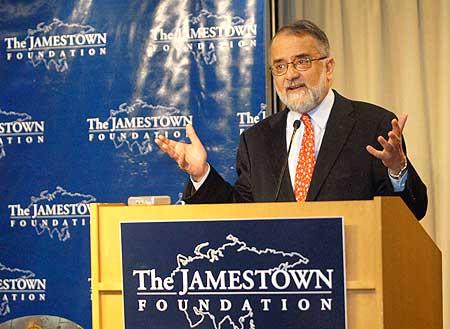
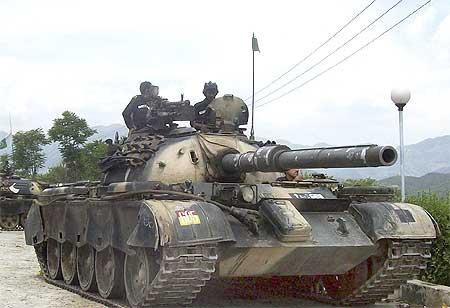
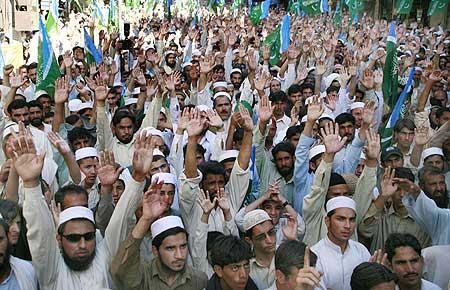

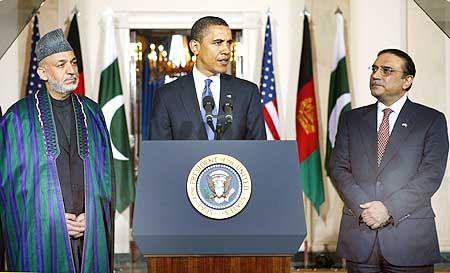
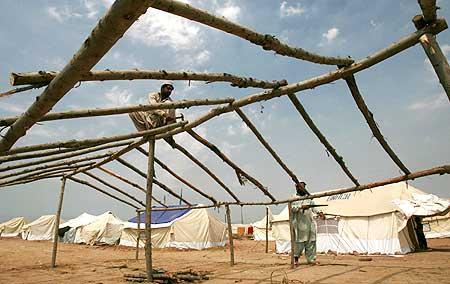
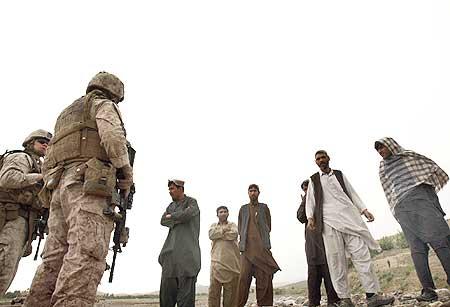
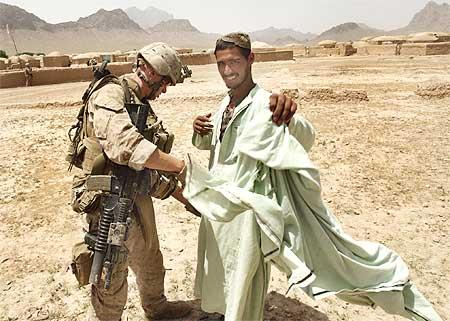
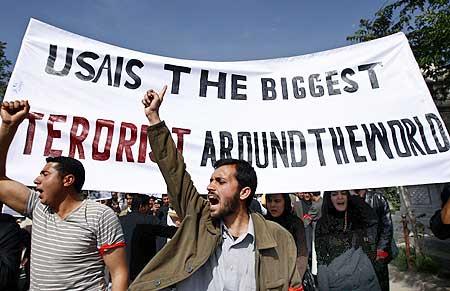
article